Is White Vinegar Good For Carpet Cleaning
White vinegar is a versatile household staple that goes beyond just adding flavor to your favorite dishes.
We will explore the wonders of white vinegar and its effectiveness in carpet cleaning, from its origins and uses to the benefits and risks of using it for cleaning.
Discover all you need to know about incorporating white vinegar into your carpet cleaning routine, including the step-by-step process and alternative methods for keeping your carpets fresh and clean.
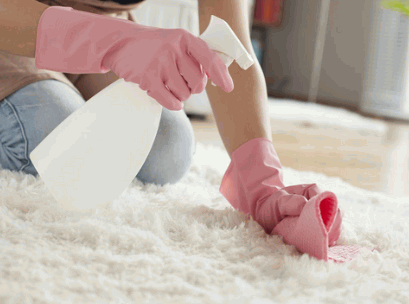
What Is White Vinegar?
White vinegar, also known as distilled vinegar, is a clear liquid made from fermenting distilled alcohol. It is commonly used in cooking and cleaning due to its acidic properties and mild flavor.
White vinegar has been around for centuries and has been produced through a relatively simple process. The distillation of alcohol produces ethanol, which is then fermented into acetic acid, the main component of vinegar. This process gives white vinegar its characteristic tangy taste and pungent odor. In terms of chemical composition, white vinegar is primarily composed of water and acetic acid, typically containing around 5-7% acetic acid. Apart from culinary uses such as pickling, salad dressings, and marinades, white vinegar is also a popular choice for household cleaning purposes due to its disinfectant properties.
Explore: What Is The Carpet Cleaner For Dog Urine
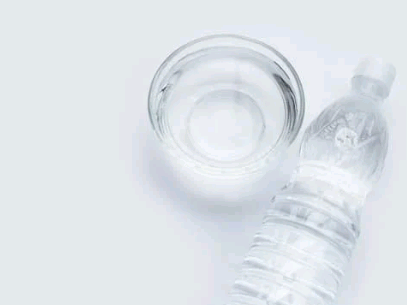
How Is White Vinegar Made?
White vinegar is typically made through the fermentation of distilled alcohol, which is then processed to remove impurities and create a clear, acidic liquid suitable for various applications.
Once the alcohol fermentation is complete, the next step in the production of white vinegar involves acetification, a second fermentation process where acetic acid bacteria convert the alcohol into acetic acid. This process not only imparts the desired sour flavor but also plays a crucial role in preserving the vinegar.
After acetification, the vinegar undergoes a series of filtration and pasteurization steps to remove any remaining solids, bacteria, or unwanted flavors, ensuring a pure and clean final product. Quality control measures such as testing for acidity levels and flavor consistency are implemented throughout the production to maintain the standards of the vinegar.
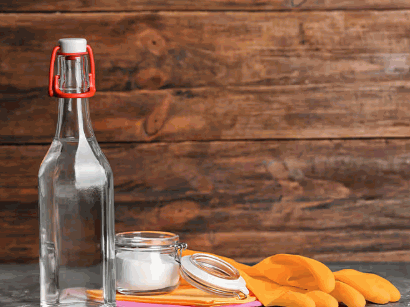
What Are The Uses Of White Vinegar?
White vinegar has a wide range of uses, including cooking, cleaning, and even as a natural disinfectant. Its versatility and mild acidity make it a popular choice for various household tasks.
In culinary applications, white vinegar is commonly used in pickling, marinades, and salad dressings, adding a tangy flavor profile to dishes.
In terms of household cleaning, it serves as an effective and eco-friendly alternative to harsh chemicals, tackling grease, grime, and odors.
White vinegar can be incorporated into skincare routines as a toner or clarifying treatment, thanks to its gentle exfoliating properties.
Can White Vinegar Be Used For Cleaning?
White vinegar is a versatile and effective natural cleaner that can be used to clean various surfaces in your home without harsh chemicals or artificial fragrances. Its acidic nature helps break down dirt and grime, making it an eco-friendly cleaning solution.
One of the significant benefits of using white vinegar for cleaning is its disinfectant properties. It has antimicrobial properties that make it effective in killing germs and bacteria, making it a great choice for maintaining a hygienic environment in your home. White vinegar is safe to use on different surfaces such as countertops, floors, and glass without causing damage or leaving behind any residue. This versatile cleaner is also cost-effective, readily available, and environmentally friendly, making it a popular choice for natural cleaning enthusiasts.
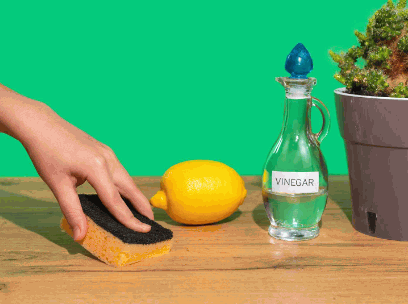
What Are The Benefits Of Using White Vinegar For Cleaning?
Using white vinegar for cleaning provides several benefits, including natural odor removal, stain removal, and disinfection. It is a cost-effective and eco-friendly alternative to commercial cleaning products.
White vinegar’s acidic nature makes it a powerful cleaning agent that not only cuts through grease and grime but also helps maintain a germ-free environment. Its versatility allows it to be used on various surfaces, from kitchen countertops to bathroom tiles, leaving them sparkling clean.
In addition, white vinegar is gentle yet effective, making it suitable for households with children and pets. By incorporating white vinegar into your cleaning routine, you can enjoy a fresh and hygienic living space without the use of harsh chemicals.
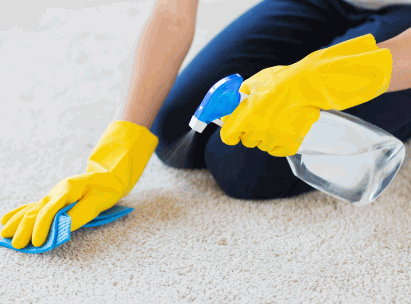
How Does White Vinegar Clean Carpets?
White vinegar acts as a natural carpet cleaner by breaking down stains, neutralizing odors, and disinfecting fibers. Its acidic properties penetrate deep dirt and grime, making it an effective solution for freshening up carpets.
When white vinegar is applied to carpet stains, its acidic nature helps to dissolve the residue left behind. This makes it easier to blot away the blemish without causing damage to the carpet fibers. The deodorizing properties of white vinegar helps eliminate foul odors that may have been trapped within the carpet. This dual action of stain removal and odor neutralization ensures a thorough cleaning process.
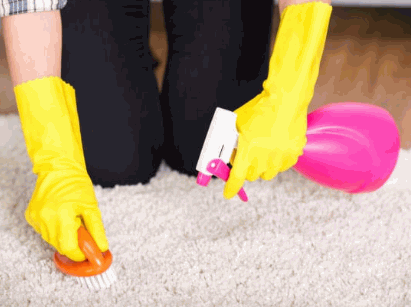
What Are The Steps To Clean Carpets With White Vinegar?
Cleaning carpets with white vinegar involves several steps to ensure thorough stain removal and odor elimination. By following a systematic approach, you can effectively deep clean your carpets using this natural solution.
To start, for spot cleaning, mix equal parts white vinegar and water in a spray bottle. Make sure to test in an inconspicuous area first. Spray the solution on the stain, let it sit for a few minutes, then blot with a clean cloth.
For deep dirt removal, create a solution of 1/4 cup vinegar, 1 tbsp dish soap, and warm water. Use a scrub brush to work the mixture into the carpet, then rinse with water and blot thoroughly.
For regular maintenance, vacuum your carpets weekly and use a vinegar solution in a carpet cleaner for a fresh scent and deeper cleaning.
What Are The Other Ingredients That Can Be Used With White Vinegar For Carpet Cleaning?
Along with white vinegar, other ingredients such as baking soda, dish soap, and hydrogen peroxide can enhance the cleaning power and stain removal capabilities when used in combination. These ingredients work synergistically to tackle tough stains and refresh carpets effectively.
When combined with white vinegar, baking soda acts as a powerful natural deodorizer and abrasive cleaner that helps lift dirt and grime from the carpet fibers.
Incorporating dish soap in the cleaning solution aids in breaking down grease and oil-based stains, making it easier to lift these stubborn marks off the carpet surface.
The use of hydrogen peroxide can provide a boost to the cleaning process by effectively targeting and neutralizing organic stains like blood or pet accidents, leaving the carpet sanitized and refreshed.
Baking Soda
Baking soda is a versatile ingredient that can be used in carpet cleaning to create a paste for treating stubborn stains and absorbing odors. When combined with white vinegar, baking soda forms a powerful cleaning mixture that penetrates deep into carpet fibers for a thorough cleaning.
Baking soda acts as a gentle abrasive when making a paste for stain removal on carpets, helping to break down the tough spots without damaging the fibers. Its deodorizing properties also make it an effective option for freshening up carpets and eliminating unwanted smells. When white vinegar is added to the mix, it not only boosts the cleaning power but also helps to neutralize odors, leaving your carpets looking and smelling fresh. The combination is particularly useful for removing tough pet stains and odors, making it a go-to solution for pet owners dealing with accidents.
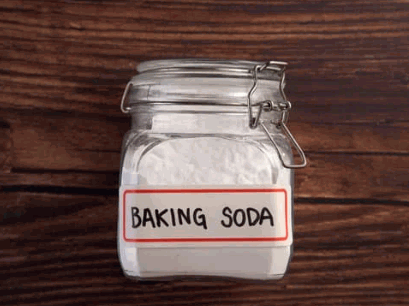
Dish Soap
Dish soap can be a useful addition to white vinegar for carpet cleaning, especially when dealing with non-greasy stains or spills. Its mild yet effective cleaning properties help lift dirt and grime from carpet fibers without leaving a residue.
The combination of dish soap and white vinegar is gentle on carpets and safe for most types of carpet fibers, making it a versatile and cost-effective cleaning solution. This DIY carpet cleaning method allows you to effectively tackle tough stains without the need for harsh chemicals, promoting a healthier indoor environment for you and your family. By utilizing the strength of natural ingredients like white vinegar and dish soap, you can achieve a deep clean that leaves your carpets looking fresh and revitalized.
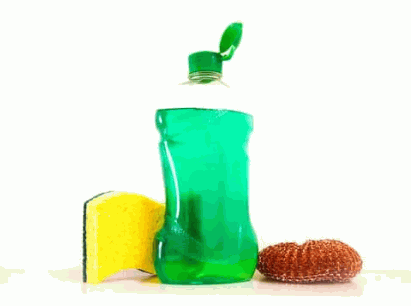
Hydrogen Peroxide
Hydrogen peroxide can be an effective stain remover when combined with white vinegar for carpet cleaning. Its bleaching properties help tackle tough stains and disinfect carpet fibers, leaving them fresh and clean.
Hydrogen peroxide serves as a versatile cleaning agent, capable of eliminating bacteria, viruses, and mold spores that might lurk within the carpet fibers. When used in combination with white vinegar, the two substances create a powerful cleaning solution that can target a wide range of stains while also neutralizing odors.
The bubbling reaction that occurs when hydrogen peroxide and white vinegar are mixed can help lift dirt and grime from deep within the carpet, making it easier to vacuum away the residue. This synergy between hydrogen peroxide and white vinegar is ideal for maintaining a clean and hygienic living environment.
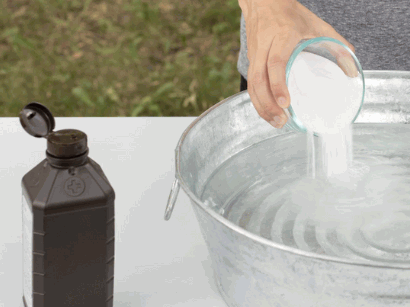
Are There Any Risks Of Using White Vinegar For Carpet Cleaning?
While white vinegar is generally safe for most carpets, there are some risks to consider. It may damage certain types of carpets, cause skin irritation if not diluted properly, and leave a strong vinegar smell if not rinsed thoroughly.
When using white vinegar for carpet cleaning, it’s crucial to take necessary precautions to avoid any potential issues. Diluting the vinegar in water before application can significantly reduce the risk of damage and skin irritation. A common recommendation is to mix one part white vinegar with three parts water in a spray bottle for a safe and effective solution.
To mitigate the lingering vinegar smell, ensure thorough rinsing of the carpet with water after the cleaning process. Testing the vinegar solution on a small, inconspicuous area of the carpet can help you determine its compatibility before applying it to the entire carpet surface.
May Damage Certain Types Of Carpets
While white vinegar is effective for most carpets, it can potentially damage delicate or natural fiber carpets such as wool or silk. It’s important to test a small, inconspicuous area first to ensure compatibility.
For wool carpets, which are known for their luxurious feel and durability, using white vinegar may lead to discoloration or weakening of the fibers over time. Silk carpets, prized for their softness and sheen, are also at risk of damage from the acidic nature of vinegar.
Conducting a patch test involves applying a small amount of the cleaning solution to a hidden corner of the carpet and observing any adverse reactions for at least 24 hours before proceeding with overall cleaning.
Alternatives to white vinegar for delicate carpets include gentle detergent solutions or specialized carpet cleaners recommended for wool and silk materials.
Can Cause Skin Irritation
Undiluted white vinegar can cause skin irritation, especially for individuals with sensitive skin. It’s essential to wear gloves and ensure proper ventilation when using vinegar for cleaning to prevent any adverse reactions.
White vinegar, while a popular natural cleaning agent, contains acetic acid that can be harsh on the skin. To minimize the risk of irritation, always dilute vinegar with water before use. A recommended ratio is one part vinegar to five parts water for most cleaning tasks. Avoid prolonged skin contact and consider conducting a patch test on a small area before widespread application. If skin irritation occurs, immediately wash the affected area with soap and water. Remember, prevention is key to enjoying the benefits of vinegar without any unwanted side effects.
Can Leave A Strong Smell
White vinegar, if not rinsed thoroughly, can leave a strong acidic smell on carpets that may linger for some time. Proper ventilation and thorough rinsing are essential to avoid overpowering odors.
One effective technique is to dilute the vinegar solution with water before application to reduce the intensity of the smell. Additionally, placing bowls of baking soda around the room can help absorb any lingering odors.
Ensuring proper airflow by opening windows and using fans can aid in dissipating the smell quickly.
How Often Should White Vinegar Be Used For Carpet Cleaning?
The frequency of using white vinegar for carpet cleaning depends on factors such as foot traffic, pet presence, and the level of soiling. For regular maintenance, a deep clean with white vinegar every 3-6 months is recommended to keep carpets fresh and stain-free.
When deciding on the optimal frequency of white vinegar treatments, it’s essential to assess the specific conditions of your living space. For high-traffic areas or homes with pets, more frequent cleaning sessions may be necessary to combat odors and stains. On the other hand, for lightly used areas, a bi-annual deep cleaning routine could suffice.
Incorporating white vinegar into your carpet cleaning regimen not only helps to eliminate bacteria and odors but also serves as a natural and cost-effective solution for maintaining carpet hygiene. By scheduling deep cleaning sessions every few months, you can prolong the lifespan of your carpets and create a healthier indoor environment.
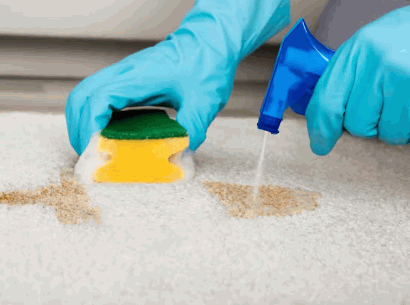
What Are The Alternatives To White Vinegar For Carpet Cleaning?
While white vinegar is an effective natural cleaner, there are alternative methods for carpet cleaning. Commercial carpet cleaners, steam cleaning, and professional cleaning services offer comprehensive solutions for tough stains and deep dirt removal.
Commercial carpet cleaners are formulated with powerful stain-fighting chemicals that can penetrate deep into the carpet fibers to break down and lift stubborn stains and dirt. These cleaners are particularly useful for high-traffic areas that experience heavy soiling.
Steam cleaning technology, also known as hot water extraction, uses hot water and detergent under high pressure to effectively clean carpets. It not only removes dirt and stains but also kills bacteria and allergens, making it ideal for households with pets or allergies.
Professional cleaning services bring expertise and specialized equipment to ensure a thorough and meticulous cleaning process. They can assess the type of carpet, its condition, and the best approach to clean it without causing damage, providing a tailored solution for individual carpet cleaning needs.
Commercial Carpet Cleaners
Commercial carpet cleaners are formulated to tackle tough stains and deep dirt effectively, offering convenience and professional-grade cleaning power for carpets. They are available in various forms, including sprays, foams, and concentrates.
One of the key advantages of using commercial carpet cleaners is their targeted approach toward removing even the most stubborn stains, which can be challenging to tackle with traditional household remedies like white vinegar. These cleaners are specifically designed to penetrate deep into the carpet fibers, lifting away dirt and grime effectively.
Commercial carpet cleaners come in a range of formulations tailored to different needs. From quick-action sprays for immediate spot treatments to powerful foams that provide a deep cleansing action, there is a product suitable for every type of carpet and cleaning requirement.
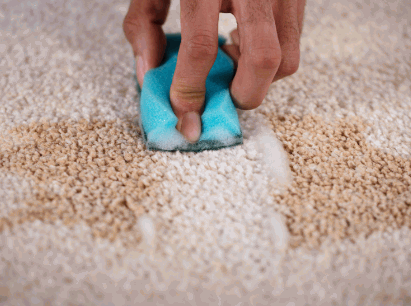
Steam Cleaning
Steam cleaning is a popular method for deep cleaning carpets, as it uses hot water vapor to penetrate carpet fibers, loosen dirt, and sanitize the surface. It offers a thorough and efficient solution for removing deep-seated dirt and grime.
One of the key benefits of steam cleaning is its ability to reach deep into the carpet, extracting dirt and allergens that regular vacuuming may miss. The high temperature of the steam not only removes dirt but also kills bacteria and germs, leaving your carpets sanitized and fresh.
Unlike some chemical cleaners, steam cleaning is an eco-friendly approach that does not require harsh chemicals that can be harmful to the environment or your health. It is a safe and natural way to keep your carpets clean and hygienic.
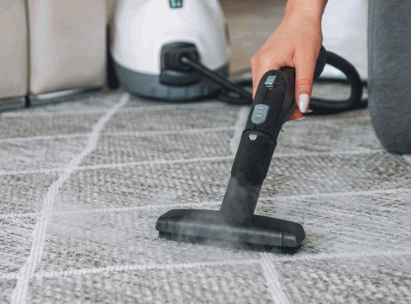
Professional Carpet Cleaning Services
Professional carpet cleaning services provide expert solutions for maintaining and restoring carpets to their pristine condition. These services utilize advanced equipment, specialized cleaning agents, and industry best practices to deliver exceptional results.
By hiring professional carpet cleaning services, you can save time and effort while ensuring a higher level of cleanliness than DIY methods can achieve. Professionals have the knowledge and experience to tackle tough stains and odors effectively, using techniques that are safe for your carpet fibers. Their services often include deep cleaning methods such as hot water extraction, which penetrates deep into the carpet pile to remove embedded dirt and allergens. This thorough cleaning process not only enhances the appearance of your carpets but also promotes a healthier indoor environment for you and your family.

